Welcome to the 65 awesome new readers who joined us in the past week!
If you haven’t subscribed, join 3,347 smart, curious people interested in Changing Greece.
🐉🇬🇷 5 economic myths about Greece
Do you remember MythBusters?
MythBusters was one of the greatest TV shows ever and a personal favorite of mine.
Each episode used to focus on a few popular beliefs (rumors, myths, folk tales) and the awesome team led by Jamie Hyneman and Adam Savage would go and test them through awesome experiments with insane sound effects. Their blow-up-everything approach and artful scientific communication was unmatched.

Why did I bring MythBusters up? Well, because popular culture is full of “myths” about the status of the Greek economy that come up often in discussions.
Here are the top 5 myths about the Greek economy that I see repeated again and again in popular discourse:
Greek unemployment decrease is not real
Greeks are lazy and do not work hard enough
More Greeks are leaving Greece today than ever
Greeks are some of the poorest people in Europe
Greece’s industrial production base is dead
Now, I do not have the MythBusters’ lab resources or team size to test every wild theory in detail — and I certainly am not up for explosions! However, I do have the power of data and figures to help debunk some aspects of these five popular ‘myths’.
Greece has a gazillion of real problems to solve. It certainly does not need the unnecessary burden of false beliefs to be added to them.
Time for some myth-busting.
Myth 1: Greek unemployment decrease is not real
Myth: The Greek unemployment curve is not “really improving.” The official rate hides a large number of part-time and temporary workers. Many Greeks have left the country anyways and many more are dying due to bad demographics, so real unemployment is actually much higher.
Reality: The total number of employed workers is consistently going up. Part-time employees are consistently decreasing. Temporary workers are unchanged.
After bottoming out at 3.15 million in Q1 2015 at the peak of the Greek crisis, Greece now had more than 4.04 million full-time employed workers in Q4 2024. That’s the highest number since Q3 2010 — a 14-year record.
Part-time employees in Q4 2024 stood at 240k, the lowest number in more than 15 years of available data.
Permanent employees have increased by 30% in less than a decade, from 2.12 million in Q1 2016 to 2.74 million in Q4 2024.
Temporary workers have been mostly unchanged during the same period, hovering around 289k on average, following the annual cyclicality of Greece’s large tourism sector.
Myth 2: Greeks are lazy and do not work hard enough
Myth: Greeks are lazy and do not work a lot. They live at the beach. Greeks are having such a great time thanks to the loans and support from the rest of Europe.

Reality: The stereotype of the lazy Greek could not be further from the truth. Greeks work extremely hard, more than any other EU country in aggregate. The real problem is not how much Greek people work, but how smart they spend their work hours.
Greece has the longest average actual work hours per week in all of EU (Bosnia & Herzegovina, Serbia and Turkey score higher but are not in EU).
Greece has the largest percentage of employed people working long hours.
Sadly, Greeks do not work smart. We work long hours, but we are not efficient with our time and not productive enough compared to the rest of the EU. Labour productivity is a key problem to address. This starts from the top: both in terms of how the state creates incentives but also due to terrible local managerial culture.

Myth 3: More Greeks are leaving Greece today than ever
Myth: Greeks are leaving Greece in droves and nobody is coming back to the country. Things are even worse than they were before. Brain drain is killing us.
Reality: The large wave of Greeks emigrating to other countries since the beginning of the crisis is undeniable. However, in recent years the trend has been reversing, with fewer people leaving and more people coming back. Brain drain has been reversing.
From a peak of almost 70k Greek citizens leaving Greece in 2012, we have fallen to less than half for the past two years of available data (2021 and 2022). The number of leavers is now almost equal to the number of people coming back.
According to a recent study, most of the recent Greek emigres left Greece during 2010-2012, with a clear uptick again in 2015. The fewest people left in 2019.

Out of the Greeks that have returned, the majority have decided to come back after 2019. COVID has acted as a multiplier, with 2020 being the top year of returnees. Unfortunately, last year was the weakest in 8 years.

If we look at the wider migration numbers (which include anyone who has lived or left the country, including foreign citizens and refugees), we see that the trend has also reversed: in 2023, total emigration (out of Greece) was at the lowest number since 2010, while total migration (into Greece) is now very high.
Myth 4: Greeks are some of the poorest people in Europe
Myth: Greeks are extremely poor. They have become and will remain some of the poorest in Europe and there is no way to change their sad fate.
Reality: Greeks are far from the richest but also far from the poorest people in the EU. Contrary to popular belief, Greece is somewhere in the middle in terms of wealth dynamics, which is remarkable, especially given the deep financial crisis the country underwent. Of course, there is tremendous room for improvement, especially given how much the average salary has fallen in the 2010s and how low it remains today.
Greece is right at the median in terms of its share of EU’s total financial assets belonging to households.
Greece is again somewhere in the middle when it comes to household financial assets as a percentage of GDP.
If we look at the financial assets of the average Greek per capita for 2023, Greece scores 29th (out of 57 countries) on a net level and 28th on a gross level.

Greece’s distribution of wealth is one of the most balanced, again falling somewhere in the middle of advanced economies around the world.

Total net wealth of Greek households has now reached almost 1 trillion euros (956 billion euros in Q2 2024), up 31% from the beginning of 2022. While Greece stands second to last in terms of GDP per capita (after Bulgaria) in the EU, it also comes 10th out of 18 Eurozone countries with regards to net wealth. As explained by Panagiotis Kapopoulos, the Chief Economist of Alpha Bank, the reason for this “paradox” is that Greeks have created hidden wealth through years of accumulated tax evasion proceeds.

Most countries have experienced an increase both in average an median wealth between 2008 and 2023. Unfortunately, the financial crisis was brutal for Greece, making it the only country with considerable decreases over the same period. A lot needs to be done to properly reverse this trend.
Myth 5: Greece’s industrial production base is dead
Myth: Greece has virtually no production. Nothing of value is created in Greece. Factories are closing and the Greek industrial base is dying.

Reality: Greek industry is actually thriving. While a few notable factories have closed or moved abroad over the past years, many more ramped up production and opened up. Industrial production has been rising consistently since 2014 and is also growing faster than the European average. As the President of the Federation of Industries of Greece, Loukia Saranti, notes in a recent oped: Greece’s industry contributes 9% of the country’s GDP and creates 72% of its export value.
Greece’s industrial production index is experiencing a revival, reaching in 2024 its highest rating since 2008. That’s a 16 year high, for those of us who are counting.
Importantly, Greece’s industrial production is growing significantly faster than the European average.

Conclusion
Myths sometimes take a life of their own, especially when repeated too many times.
Myths do not necessarily represent reality. In economics, they are often exaggerations of truth, fixations in old states of affairs or simply outdated data. This does not mean an old myth might not end up becoming true in the future. If you project a recession every year, you will miss 9 out of 10 years, but you will still end up being true the 10th.
But for the moment, Greece’s unemployment reduction is very real, Greeks remain the most hardworking people in Europe (although not the most efficient), fewer Greeks leave the country than in previous years (and more Greeks are starting to come back), Greek households fall on average in the middle of the European wealth distribution (even though they sadly earn less today), and Greece’s industrial production has been experiencing a comeback.
If you hear anyone say otherwise, feel free to reply with this article.
Or, you know, just let them live their myth in Greece.
🏭 Economy & Business
Morningstar DBRS upgrades Greece’s credit rating to BBB
Greece sheds its crisis reputation with an economic comeback, writes NZZ
EIB invested more than €2.2 billion in Greece during 2024
Rethinking regional attractiveness in Eastern Macedonia – Thrace
Greek academic diaspora survey: is brain regain in Greek academia possible?
Greek manufacturing output exhibits solid growth in February
New business registrations are up by 18.3% in 2024, bankruptcies down 12.3%
Metlen advertorial is full of interesting info about the large Greek conglomerate
🤖 Tech & Startups
Reflection AI (autonomous coding) out of stealth with $130M in funding
Europe's new industrial policy — how does it benefit startups?
Nvidia is opening a subsidiary in Greece for R&D, marketing, sales
AI & Greece event coming up with top Greeks in San Francisco
Lessons from DeepSeek about Greece from Andreas Stavropoulos
Digital agencies in Greece have a relatively short employee tenure
Female angel investors investing in women are on the rise
🙌 Celebrating Greek wins
Stefanos Tsitsipas makes an impressive return to the top 10 of world tennis
Kaiti Konstantinou (in memoriam) was one of the most beloved Greek actresses
Women in the Hellenic Armed Forces are awesome, amazing and impressive
Roxane Matsa Estate has an insane history (HT to my favorite Chef)
📊 Chart of the week: Did humans co-live with dinosaurs?
According to the latest Eurobarometer study, 40% of Greeks believe humans lived at the same time as the dinosaurs. That’s the highest percentage across the EU.
Unfortunately, this perception is also very false. Or is it? Hm…
Another peculiar Greek exception in Europe.
That’s it for today! If you enjoyed today’s newsletter, please let me know with a like or reply. This helps me focus more on topics that are useful to my readers.
Find me on X or Bluesky for bite-sized opinions.
Until next time!

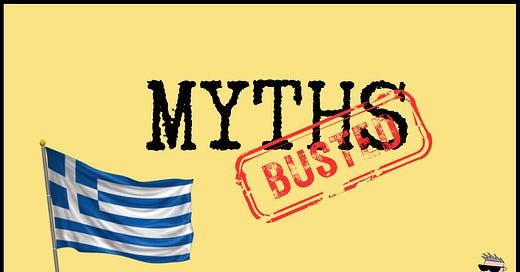



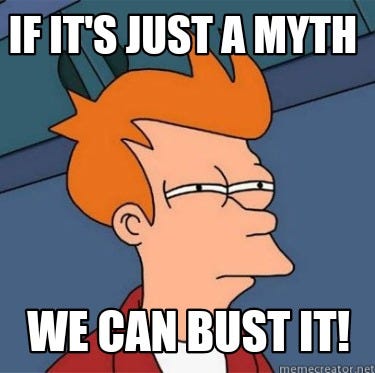

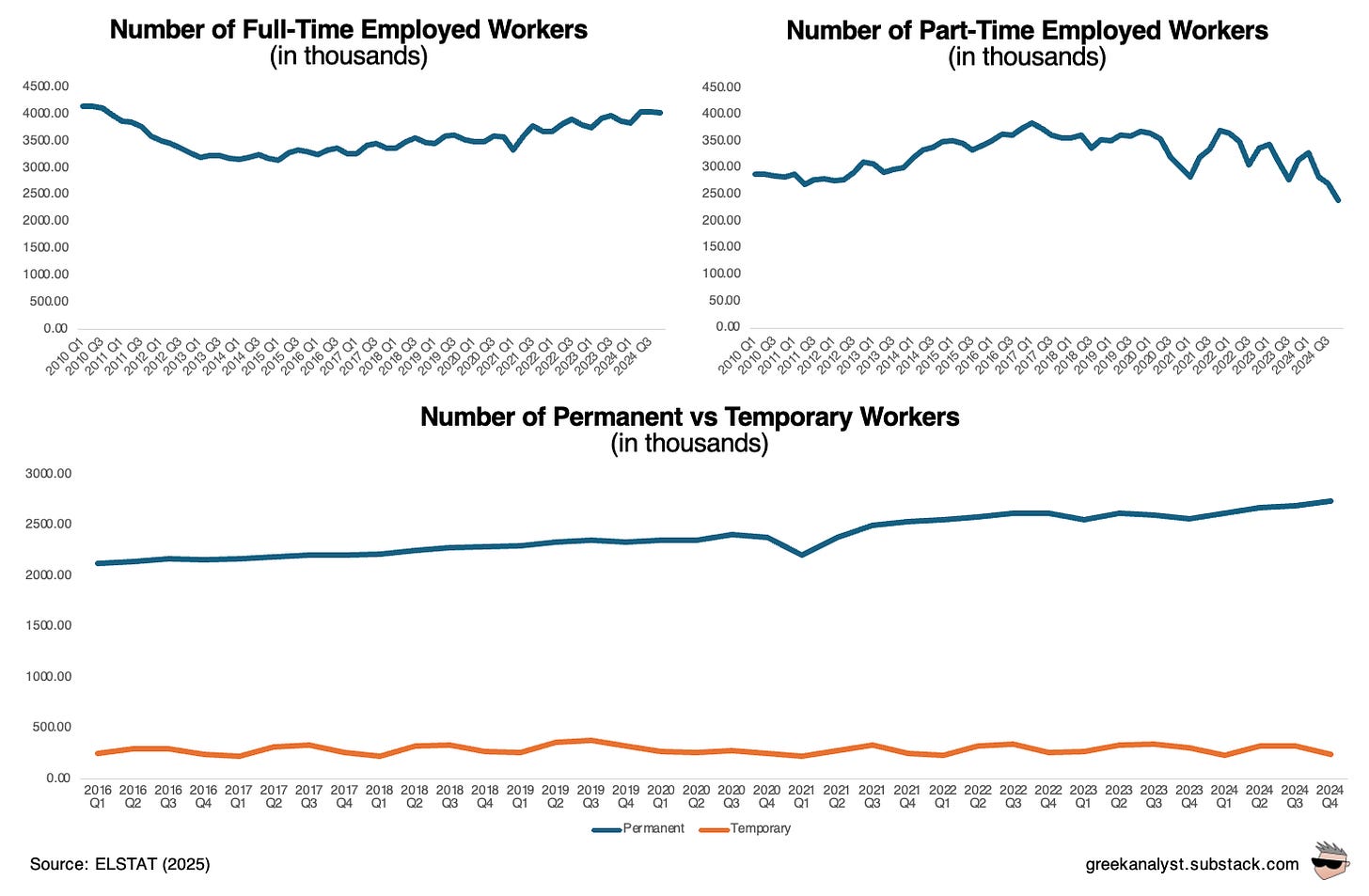
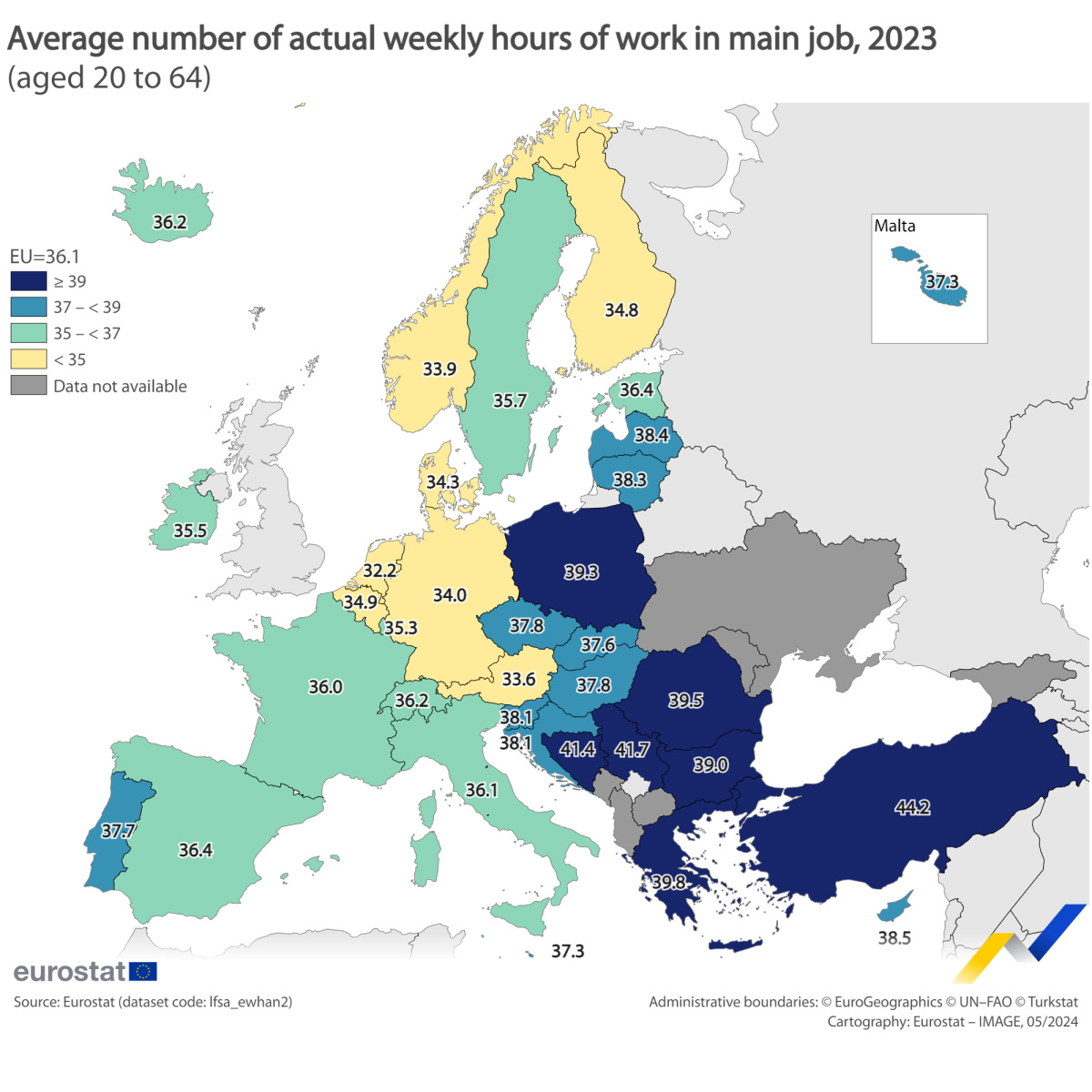







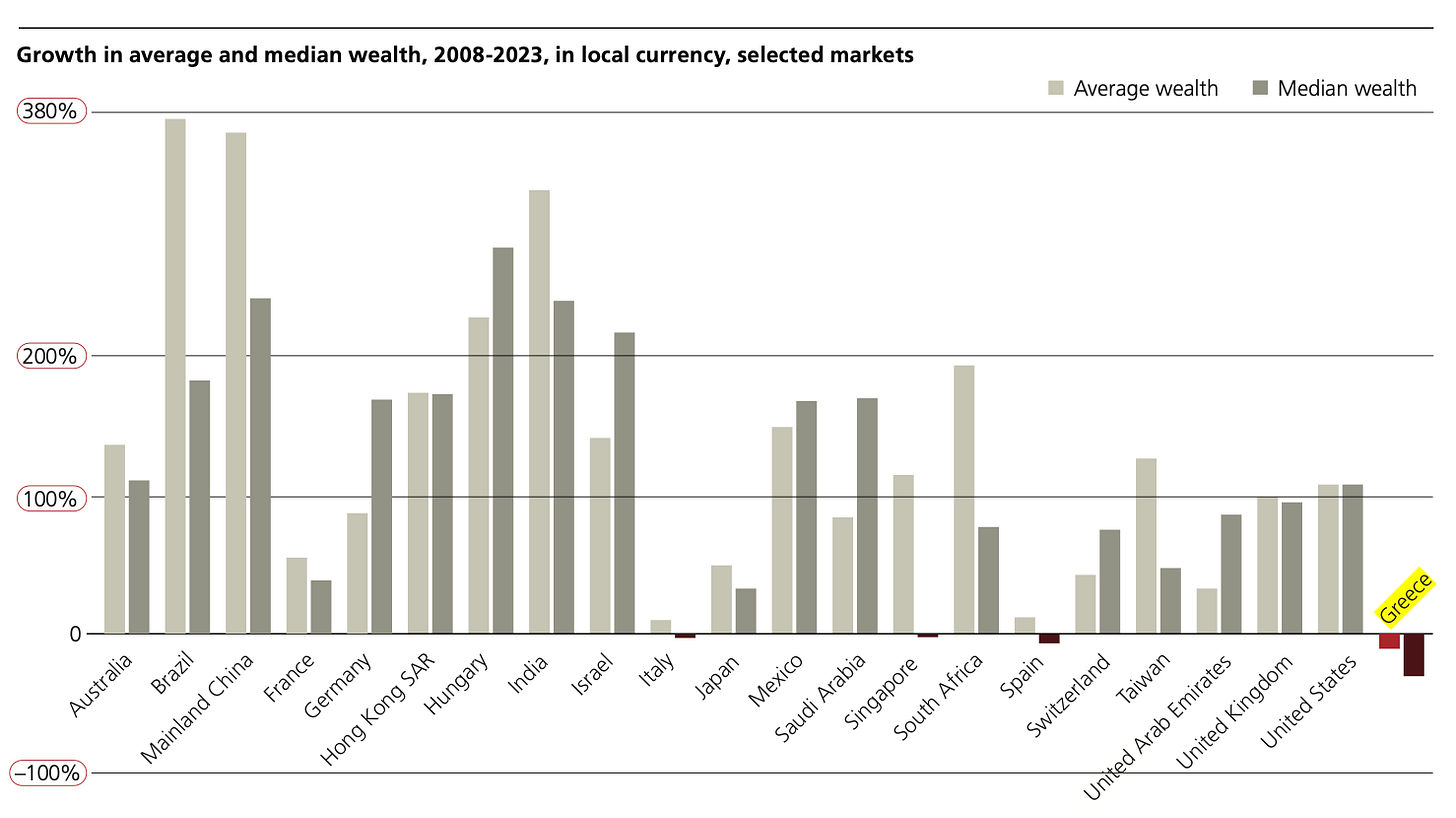





Thanks for this post. Like Alexandros mentions, I find the drop in median very interesting and it does suggest a raise in wealth inequality. I haven't read the sources you reference with respect to that, just wanted to point that out.
Finally, a more "philosophical" question. Your post suggests that there is an improvement in the financial situation of Greek people. However, the Greek reality and day-to-day life, paint a different picture. How do you explain that? Is it just me, who thinks that people actually have a harder time getting by nowadays?